Podcast music: Copyright, the rules, and where to find the best tracks
Learn about copyright, how to use tracks, and where to find the best music for your podcast.
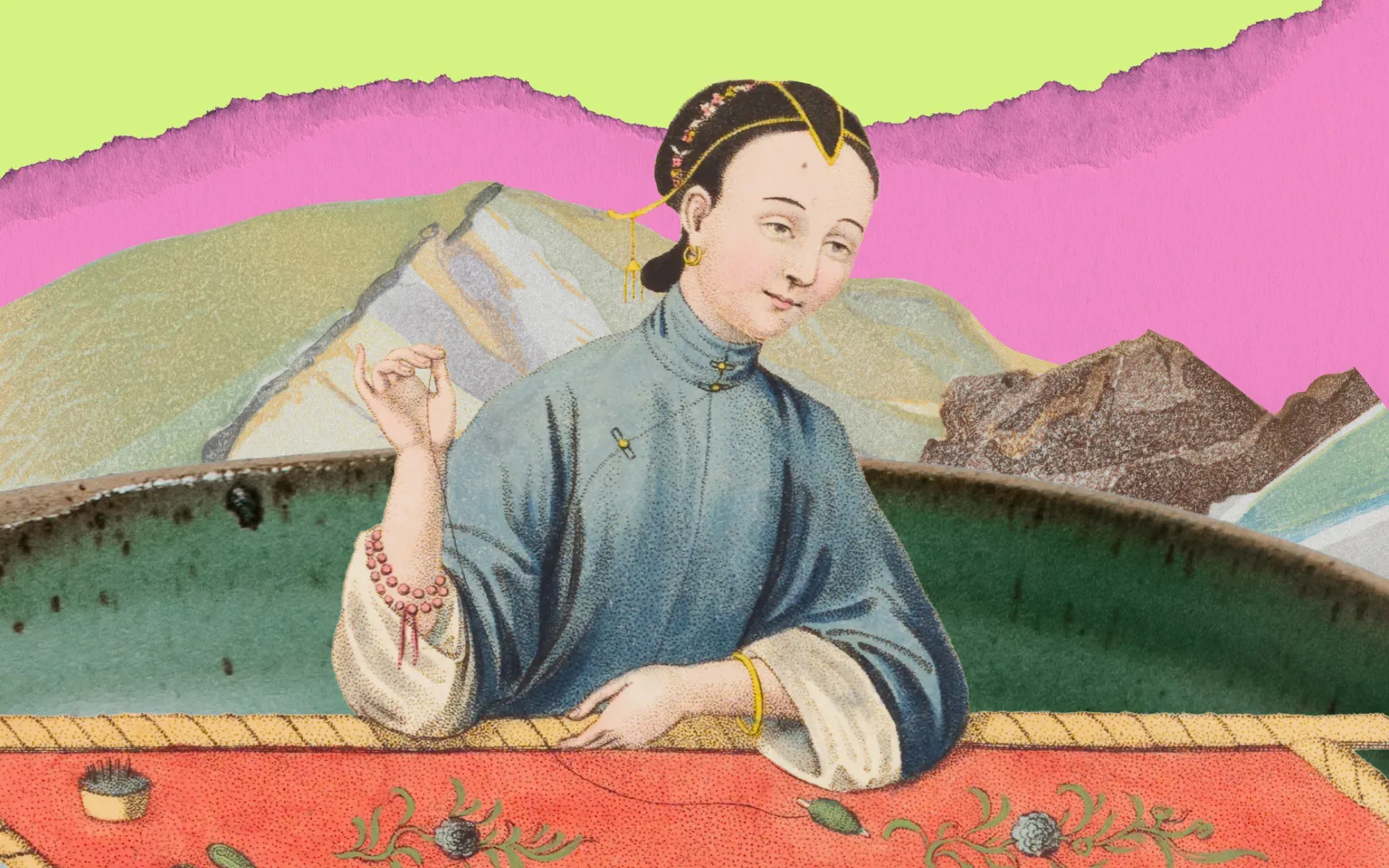
Using unlicensed music in podcast content can lead to takedown notices and legal issues. This is significant, but what does it mean for podcasters, their content, and their relationship with copyright? We’ll cover all of that, plus we’ll reveal where you can find the best podcast music for your projects.
Here’s the rundown:
- Why do people use music in podcasts?
- Is it legal to use any music in your podcast?
- Can you use a short snippet of a song for a podcast?
- Can you just give an artist credit instead of licensing their music?
- Do you need to license music if your podcast doesn’t make any money?
- Do music copyright rules change if your podcast is sponsored?
- Do you need to own the copyright to podcast music?
- Can you use YouTube Audio Library music for a podcast?
- Where can you find podcast music?
- Why you should choose Epidemic Sound for your podcast
Why do people use music in podcasts?
Content creators and brands use music for podcasts as they would for other mediums: to add color, depth, context, spice. Imagine the intro to The Simpsons, or the opening credits to Succession, without music — the whole thing doesn’t quite hang together.
The same goes for podcasts. Whether it’s a well-conceived leitmotif or a recognizable score pulsing through every episode, music makes your content sing. That becomes even more apparent when working in an audio-heavy medium like podcasts.
You’ve probably come across The Diary of a CEO podcast — it’s one of the most popular podcasts in the world. It’s a perfect example of how the soundtrack can turbocharge a podcast and demand engagement, instantly hooking the audience with propulsive, theme-appropriate music.
Is it legal to use any music in your podcast?
Is it legal to use any music in your podcast, without permission? No. Most music is protected by copyright law — a rare few copyright-free tracks aside, you’ll need a valid license.
But is it legal to use any music in your podcast, with permission? Theoretically, yes. If you have the correct license and use the music within the agreed terms, you could use just about any track in your podcast.
Can you use a short snippet of a song for a podcast?
If you only use ten seconds of a song in your podcast, or even a one-second musical sting, do you really need a license? Yep, you do.
You’re still using someone else’s work without permission or payment — even if it’s the tiniest little riff or vocal hook. As we’ll touch on throughout this article, unauthorized usage can lead to demonetization and legal issues.
It’s not completely cut-and-dry, though. Podcasts dealing in comment, criticism, education, and parody may fall under Fair Use. This is a four-pronged legal principle which allows the use of copyrighted material for “transformative” means.
However, Fair Use is decided on a case-by-case basis. If you publish soundtracked podcast content and the rights holder takes issue, it could end up in court. If said court rules against you, you could be liable for damages.
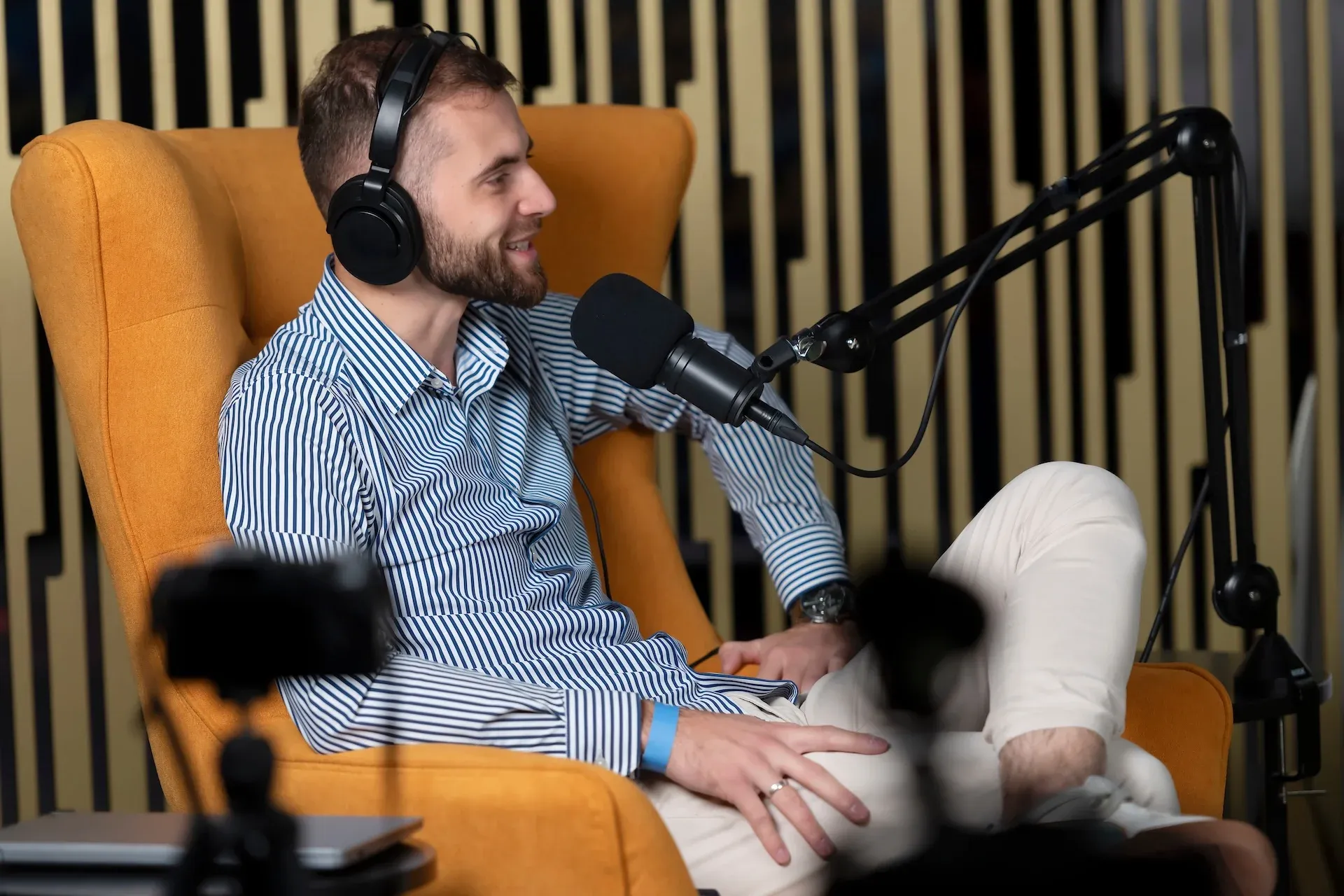
Can you just give an artist credit instead of licensing their music?
Similar to the “you can just use ten seconds” myth, you’re generally not allowed to credit an artist instead of proper licensing. You may have seen videos scattered across YouTube crediting the artist, but that doesn’t cover their backs — their content is likely demonetized as a result. Unless clearly specified, attribution doesn’t give you the right to use a track.
Do you need to license music if your podcast doesn’t make any money?
Even if your podcast is a non-profit or just a hobby, you still need the correct rights for any music you use. If you don’t, you could face legal action and financial penalties — not ideal in any case, and especially if the podcast’s not earning money.
Do music copyright rules change if your podcast is sponsored?
Different music copyright rules may apply if you’ve secured a podcast sponsorship deal. For example, a high-flying sponsor may have the license to use a song in their advertising material — your podcast may fall under that category.
If your sponsor includes your podcast in this agreement and you stick to the outlined music usage terms, you should be good to go. However, if you misinterpret the license’s boundaries, you could end up in trouble. Always double-check the terms of any agreement for podcast music, and ensure that your sponsor’s license covers your podcast.
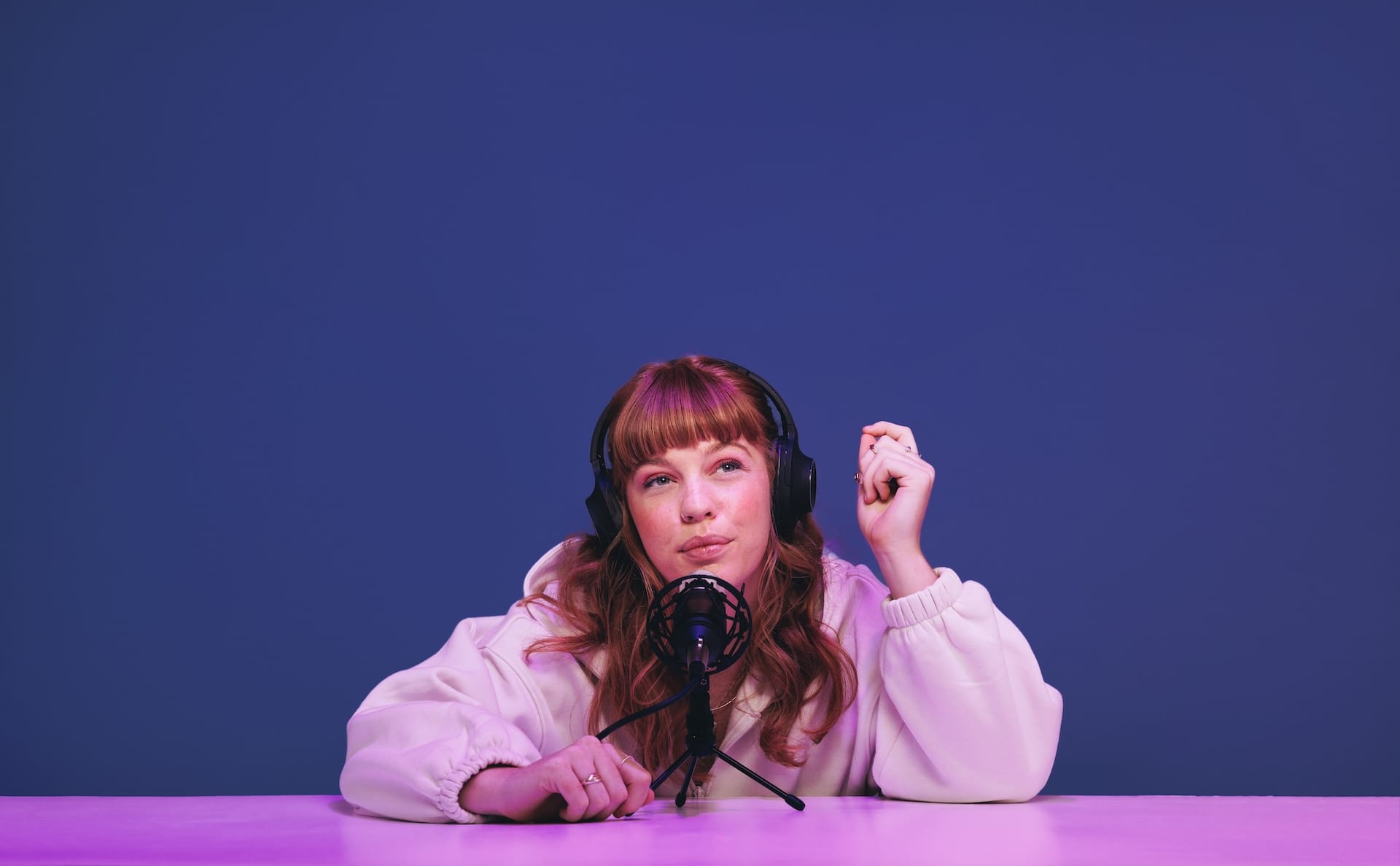
Do you need to own the copyright to podcast music?
You don’t need to be the rights holder to use copyrighted music for a podcast. However, if there is a rights holder — and there usually is — you need the correct license to use their material.
Can you use YouTube Audio Library music for a podcast?
If you’re creating video podcasts, YouTube seems like a solid place to start — after all, it’s the world’s second-largest search engine after Google. Building, editing, and publishing visual podcast content is encouraged within the platform, and you can even soundtrack it with the YouTube Audio Library.
This does come with limitations, though. YouTube Audio Library’s royalty-free selection only includes around 1,500 tracks, most of which are designed for exclusive use on the platform. If you soundtrack a video podcast with the YouTube Audio Library and distribute it across other platforms, you may fall foul of copyright law.
Just creating, editing, and distributing your podcast content on YouTube? Try YouTube Audio Library. Otherwise, you might find it a little restrictive.
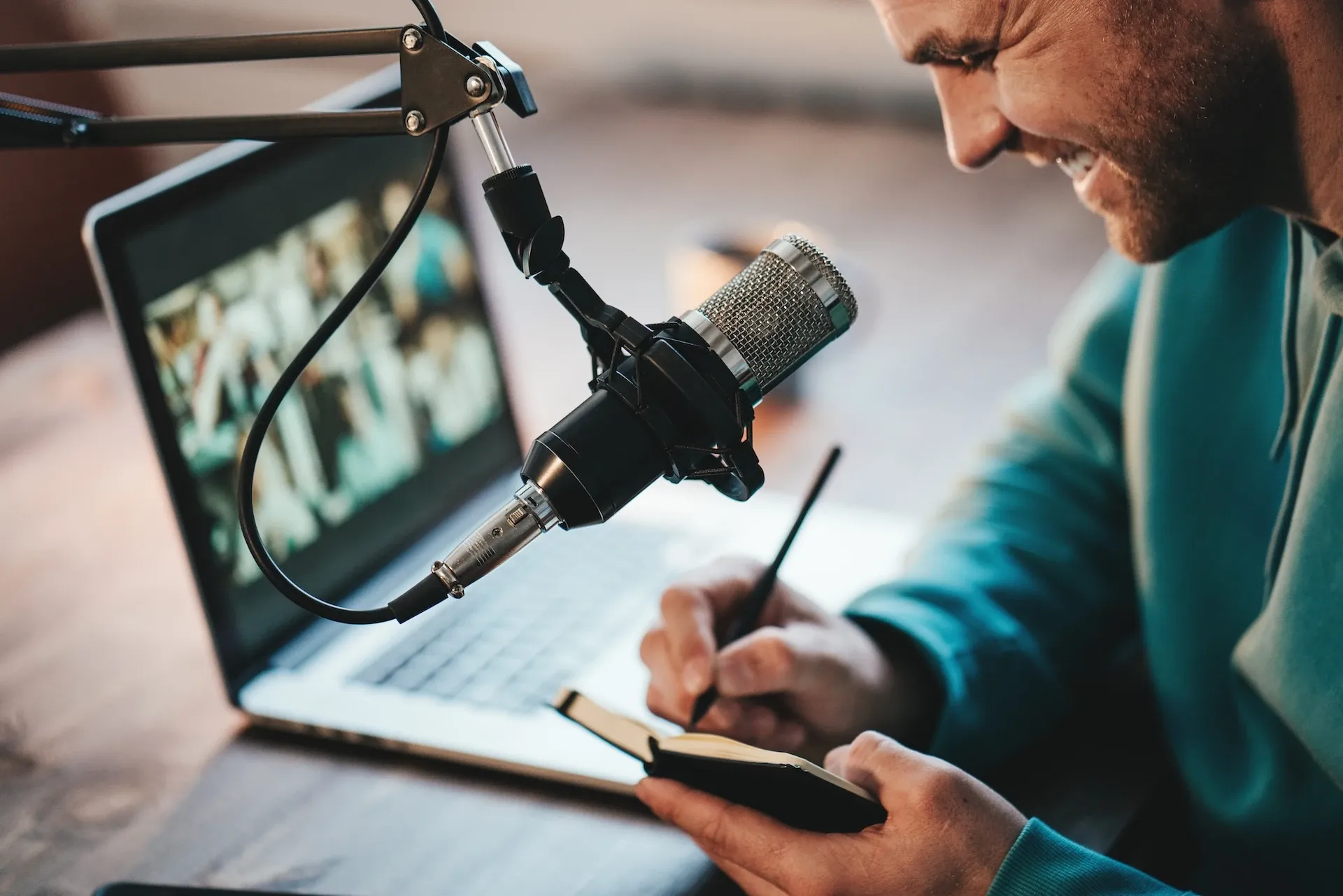
Where can you find podcast music?
We’ve briefly touched on where one can source podcast music — let’s dig into the details. Here are the four core types of music for podcasts, and the places you can find them.
Commercial music
Commercial music. Chart music. “Popular” music. Sure, you might be able to use the latest Taylor Swift bop in a TikTok clip, but the rules for podcasts are different. Commercial music requires clearance from all of the rights holders. This likely includes the artist, other composers, labels, publishers, and more — it’s complex, time-consuming, and expensive.
Want to use AC/DC’s Thunderstruck in your podcast? Its license literally costs hundreds of thousands of dollars. These kinds of tracks are iconic, and the rights holders know it. Unless you have the funding to balance these expenses against the rest of your production, commercial music is an unrealistic option for soundtracking your podcast.
Production music
Production music companies offer licenses for ready-made tracks suited for video and audio content. They’ll often charge per song, and rates may vary depending on the duration and nature of usage.
Even though production music companies own the core rights to their catalogs, there could be additional fees down the road. For example, using said music may incur a performing rights society (PRO) fee, which kicks in every time the track is used publicly. While production music catalogs may seem convenient and varied, they can get pretty pricy.
Commissioned music
If you personally know an artist, why not commission them to compose music for your podcast? Or, if you have a specific artist in mind, you could reach out to them and ask if they do commissioned projects — you might be in luck. If you’re really desperate and want to make those piano lessons from fifteen years ago seem worthwhile, you can always record something yourself.
As long as the terms of your deal are clear, or you own the rights yourself, you should be good to go. Commissioning and refining podcast music is hard work, and often costs more than you’d like…but when someone nails it, you can see why they went to the trouble.
Composer Miguel D’Oliveira has a strong working relationship with broadcaster Louis Theroux, having scored several of his documentaries over the past decade. When Theroux launched his standalone podcast, it made sense for D’Oliveira to deliver the music. His playful, off-kilter intro music embodies Theroux’s weirdness, liveliness, curiosity like nothing else.
Royalty-free music
Royalty-free music is music you can use in content without paying royalties to artists or rights holders every time it’s played. You pay for it once, or on a recurring basis if you subscribe to a royalty-free music service.
Royalty-free doesn’t mean that artists don’t receive royalty payouts — it just means you don’t pay for it. However, not all royalty-free providers own all of the rights to the music in their catalogs. This means that, similar to production music companies, you may have to pay royalties to PROs and other rights holders.
Or, you can go beyond royalty-free music with Epidemic Sound.
Why you should choose Epidemic Sound for your podcast
Sure, we’ve got more than 50,000 tracks and 200,000 unique sound effects and variations for your podcast. We offer a range of AI-powered editing tools, bespoke sonic branding, a remuneration model that puts artists center-stage, and more. But Epidemic Sound’s more than just a music catalog: we’re a soundtracking partner.
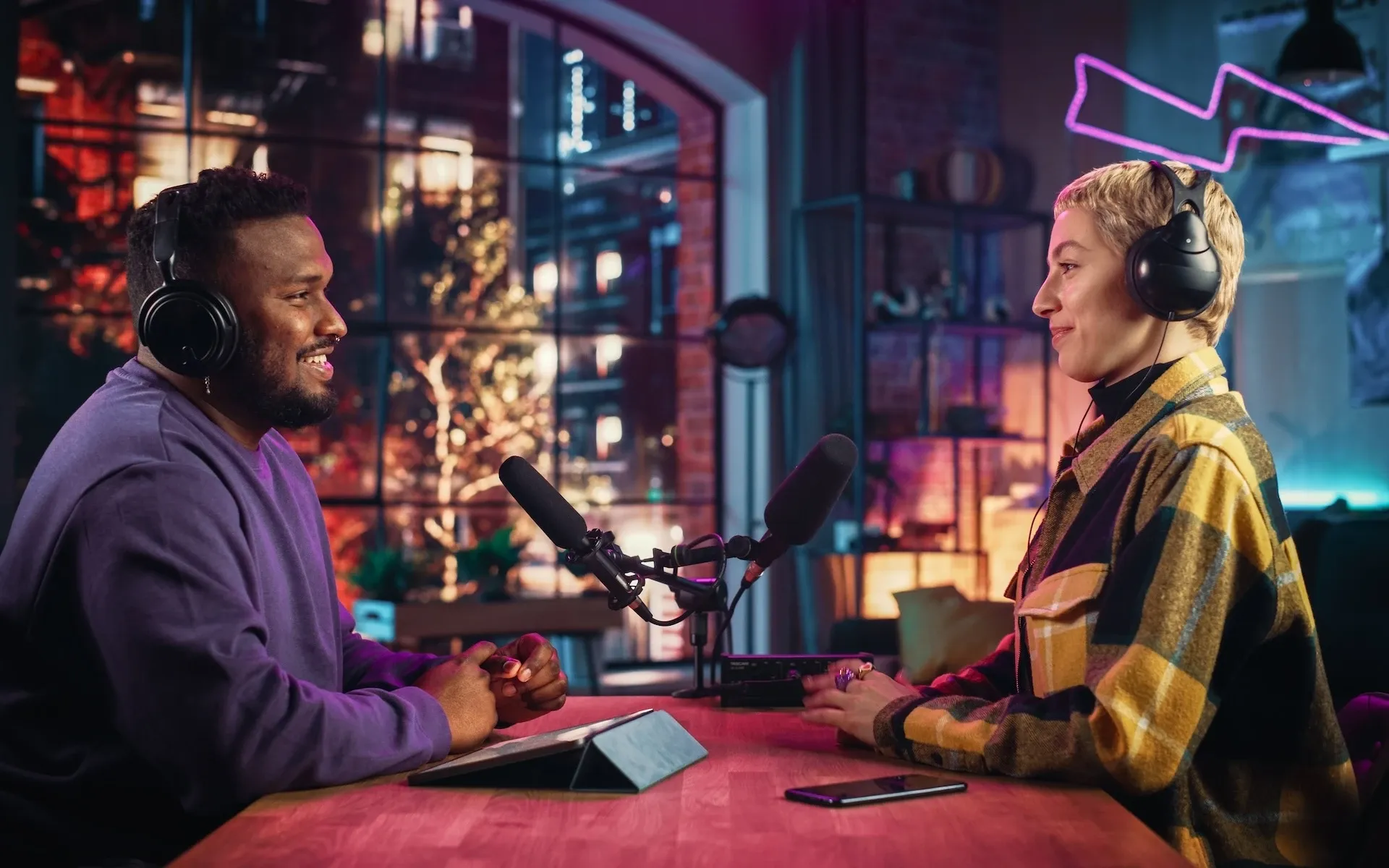
Together with iconic podcasting companies like Acast, The New York Times’ T Brand Studio, Slate, and more, we’re soundtracking the world and minimizing legal risks.
Digital media giant Slate works with Epidemic Sound because, well, they have high standards. They want to deliver top-quality, customized content at a fast pace, all while avoiding the copyright hurdles traditional licensing often presents.
Slate’s podcast producers now enjoy seamless search functionality, streamlined editing processes, and the freedom to customize tracks with stems. And, just to put a cherry on top, it’s all gift-wrapped in a convenient, legally watertight licensing model.
Clients like Slate and Acast work with Epidemic Sound because our offering goes beyond royalty-free music. We remove the headache of licensing, freeing you up to do what you do best: podcasting.
Experience the safety of our license hand-in-hand with our massive catalog of 50,000 tracks, covering just about every genre you can think of. You’ll also gain unlimited access to our advanced search functions — finding the right sound’s never been easier.
Whether you’re an established podcast network or a budding freelancer, we’ve got you covered. Don’t lose sleep over takedowns, PROs, or complex copyright laws. Get started with Epidemic Sound below.

Related posts:

